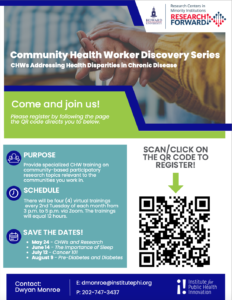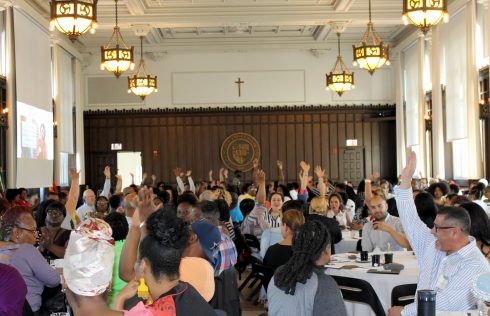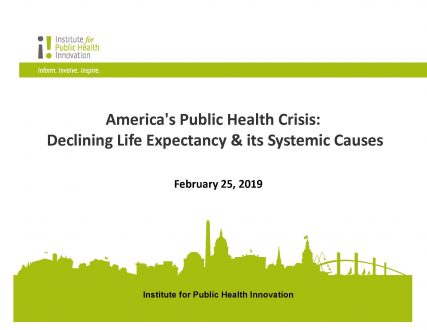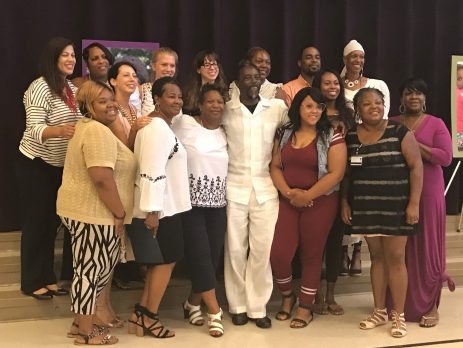Healthy Montgomery Webinar Series –
Community Food Access: Reducing Food Insecurity and Obesity through the Healthy Montgomery Transforming Communities Initiative
Part 1: October 4th | Part 2: October 16th
2:00 – 3:00 PM EST
This two-part webinar highlights innovative efforts in Montgomery County, MD that are changing how we think about food insecurity and obesity.
Part 1: Hear about the multi-faceted approach of the Montgomery County Food Council and its partners to implement the Montgomery County Food Security Plan, including creating a Food Assistance Resource Directory, a comprehensive list of hunger relief resources, and emergency food providers in Montgomery County.
Part 2: Learn about the Primary Care Coalition’s work with a group of partners to implement a screening and referral process for food-insecure clients within safety-net healthcare clinics.
About the Series: Healthy Montgomery is Montgomery County, MD’s official community health improvement planning process. Our webinar series focuses on real-world examples demonstrating how a collective impact approach improves community health. We collaborate with diverse stakeholders, including government, non-profit, hospital, and community partners. We aim to achieve optimal health and well-being for all Montgomery County residents. This series was created with support from the Healthy Montgomery Transforming Communities Initiative grant.
Part 1: Montgomery County Food Council – Best Practices Implementing the Food Security Plan
Click Here to Watch a Recording of Part 1.
Download the Webinar Slides here.
About the Webinar:
The Montgomery County, MD Food Security Plan was created through the collaborative efforts of over 300 community stakeholders and outlines a 5-year data-driven strategy to reduce the 70,000+ County residents at risk for hunger by 22%. This webinar highlights key successful strategies of the Plan’s Year One implementation, offering examples of effective partnerships between local government, nonprofits, residents, and businesses that leverage local resources to: enhance data collection and analysis through community-based metrics; increase the capacity, efficiency, and connectivity of food assistance providers; create screening and referral pathways within and across sectors to improve access to benefits and other available resources; and more thoroughly understand the unique food access barriers of subpopulations at risk of food insecurity, such as college students and foreign-born residents.
Speakers:
Mark Hodge, Montgomery County DHHS
Vice-Chair, Steering Committee; Policy Committee
Mark is the Assistant Chief Operating Officer in the Montgomery County Department of Health and Human Services (DHHS). He has worked in various roles in MCDHHS for the past 17 years including Deputy Health Officer, School Health, Immunizations, Refugee Health, and TB before recently taking on this new role. Additionally, Mark is proud to have been on the Montgomery County Food Council for nearly 4 years and is overseeing the implementation of the Montgomery County Food Security Plan for DHHS in collaboration with the Food Council. In his spare time he likes to spend quality time with his kids, exercise, travel, and discuss politics with his husband who happens to be a State Senator.
Amanda Nesher
Food Security Programs Manager, Montgomery County Food Council
Amanda manages and coordinates the implementation of the Food Council’s Food Security Plan initiatives, which aim to build a Montgomery County in which all people have access to safe, sufficient, and nutritious food, with dignity. Amanda brings considerable experience in both the public and private sectors. Most recently, she worked as the Legislative Associate for anti-hunger nonprofit MAZON: A Jewish Response to Hunger, where she advocated to protect and strengthen the federal nutrition safety net, with particular emphasis on the food security needs for veterans and military families. She previously worked as a corporate attorney at the offices of Cleary, Gottlieb, Steen & Hamilton LLP before relocating to Israel, where she worked as a Legal and Strategic Advisor for the Office of the Prime Minister. Amanda has an LL.M. from Columbia Law School in New York and a B.A. in Law from Cambridge University in England.
Thomas Tippett
Performance Analyst, Office of the County Executive, Montgomery County CountyStat
Thomas Tippett is a Performance Management and Data Analyst within the Offices of the County Executive of Montgomery County Maryland. He has been a member of the County’s Performance team for three years and has focused on supporting community development, housing programs, and the County Executive’s Food Security Strategy. Thomas has a background in Enterprise Resource Planning and Information Systems.
Jenna Umbriac
Director of Programs and Policy, Manna Food Center
Council Member, Montgomery County Food Council
Co-Chair, Montgomery County Food Council Food Recovery and Access Working Group
Jenna Umbriac is a registered dietitian and Director of Programs and Policies at Manna Food Center in Gaithersburg, MD. At Manna, Jenna directs the weekend food assistance program, Smart Sacks, community food education, and designs policies to ensure Manna is providing a safe and healthful food supplement. She works to provide regionally produced and nutritious food to Manna’s participants through donor education and partnerships with local farms and farm markets. In addition to her work at Manna, Jenna serves on the Montgomery County Food Council and co-chairs the Council’s Food Recovery and Access working group. Jenna has a M.S. in nutrition from Bastyr University and a B.S. in biology from Loyola University Maryland.
Part 2: Food Is Medicine – Reducing Barriers to Accessing Healthy Food in Vulnerable Communities
Click Here to Watch a Recording of Part 2.
Download the Webinar Slides here.
About the Webinar:
The Primary Care Coalition and community partners share highlights from the “Food is Medicine” program – a systems approach to food security screening and referral between safety-net health care clinics and food and nutrition service providers. Webinar speakers include Ben Fulgencio-Turner, Director of Coverage and Connections at the Primary Care Coalition and Lucia Zegarra, Director of Health Programs at Community Health and Empowerment through Education and Research.
Speakers:
Ben Fulgencio-Turner
Director of Coverage and Connections, The Primary Care Coalition
Ben Fulgencio-Turner is the Director of Coverage & Connections at the Primary Care Coalition of Montgomery County (PCC). He develops and manages partnerships between health care providers, local government, and community organizations, aiming to address non-clinical determinants of health.
Mr. Fulgencio-Turner’s previous work and studies centered on health access and community engagement, including work at a safety-net clinic in Washington, DC and community organizing in New Orleans. He received a Masters in Public Policy with thesis work examining the impact of local policy changes on health access.
Lucia Zegarra
Director of Health Programs, Community Health and Empowerment through Education and Research
Peruvian native, Lucia Zegarra, has been involved in community development projects from a very young age. From leading youth and environmental groups in Peru to developing and facilitating bilingual support groups for the homeless in DC, Lucia has become a strong advocate for peer support as a sustainable complement of formal health care services and prevention of disease.
After working as a quality control manager at a Microsoft call center in California, she arrived in the DC area to pursue her passion for science. Here, she obtained a B.S. in Biological Sciences at UMBC while working at the phylogenetics lab in the university. Hoping to make a difference in women’s lives, Lucia had become a certified domestic violence counselor in Los Angeles and later a certified breastfeeding counselor in DC, using the latter as a way to help minority populations achieve healthier lives. She is the recipient of a Hispanic Heritage Award sponsored by Governor Martin O’Malley’s Commission on Hispanic Affairs for being a “Leader on the Rise.”
About the Transforming Communities Initiative:
Transforming Communities Initiative (TCI) is an innovative, collaborative funding initiative established by Trinity Health, one of the largest multi-institutional Catholic health care delivery systems in the nation. Grant recipients, in collaboration with a community coalition(s), implement and support evidence-based and innovative policy, systems and environmental change strategies to reduce obesity, promote tobacco-free living and address social determinants. TCI leverages health system funding, community partnerships, local match dollars, capital loan dollars, and national technical assistance resources to improve community health. The Healthy Montgomery TCI is one of six grant recipients funded by Trinity Health across the country.
The Healthy Montgomery TCI is a collaborative partnership comprised of Holy Cross Health, the Institute for Public Health Innovation (IPHI), Montgomery County Department of Health and Human Services(DHHS), the Eat Well Be Active Partnership, and numerous other government and community partners. It is funded nationally by Trinity Health, one of the country’s largest healthcare systems. Funding is also provided by the Maryland Community Health Resources Commission, The Morris & Gwendolyn Cafritz Foundation, and the Healthcare Initiative Foundation.
For more information on the Healthy Montgomery TCI, please contact Senior Program Manager Evelyn Kelly at ekelly@institutephi.org.
 RCMI CHW Discovery Series Flyer
RCMI CHW Discovery Series Flyer

